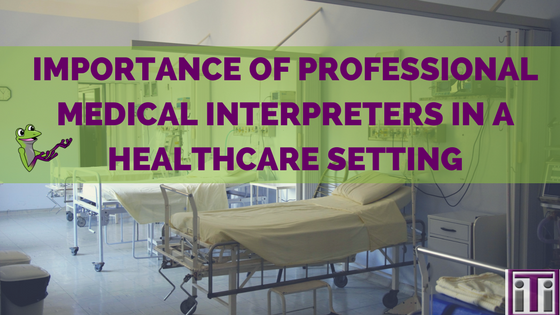
This post was originally published on July 23, 2015 and has been updated for freshness and clarity.
Professional medical interpreters are a necessity for working with and overcoming linguistic barriers in patient relations. Unfortunately, since most healthcare organizations provide either services that are inadequate, or no interpreter services at all, patients who are limited English-proficient (LEP) often do not receive quality health care.
Patient care suffers when patients and doctors have unsatisfactory communication. In fact, studies have shown that if language barriers between doctors and adult patients are not conquered, misdiagnosis and inappropriate treatment are far more likely to occur.
A 2007 study reported 52% of adverse events that occurred to LEP patients in hospitals were likely the result of communication errors.
In this post, we discuss how using professional medical interpreters shapes outcomes in healthcare settings.
What Is The Cost Of Not Hiring A Professional Interpreter?
According to an NPR article, there was a study by the American College of Emergency Physicians that analyzed interpreter errors that had clinical consequences, finding that “the error rate was significantly lower for professional interpreters than for ad hoc interpreters–12% as opposed to 22%.”
Ad hoc interpreters refer to individuals who are used as interpreters yet do not have any professional training. Often times this includes family members, bilingual nurses, or basically anyone who says they are bilingual that is available at the time of the appointment.
Ad hoc interpreters are much more likely to add or omit words, misinterpret the conversation, include their own bias, and generally not able to manage the flow of the conversation.
On the contrary, professional medical interpreters understand their role in the healthcare setting, are knowledgeable on medical terminology, and appreciate the delicate balance necessary for interpreting between providers and patients — they are trained to know when to be transparent and when to step forward.
Click here for a free guide on the roles of interpreters in a medical setting (great hand out for your team!)
In the long run, the costs of professional medical interpreters are likely to be far less than delayed care or lawsuits resulting from misdiagnosis, or mistreatment, etc. that can occur in a setting with language barriers or ad hoc interpreters.
Easing LEP Patient Stress & Promoting Comfort
Much of the initiative to hire qualified interpreters in healthcare is focused on making the experience less stressful for LEP patients.
A trip to a hospital or a small health care clinic can be nerve-wracking, even for people who are proficient English speakers. So if you are a LEP patient, you can imagine that the experience is exponentially more intimidating.
It is unquestionably important that a patient is able to converse with a medical professional in a language that they are comfortable with. This will greatly improve interactions between the patient and doctor, which will help make the patient feel more secure.
Opt For Certified Interpreters
Some hospitals and doctors use over the phone interpreting so that they can receive assistance in their desired language. However, the people who work for these language services often aren’t certified to be medical interpreters, meaning that they don’t have an extensive understanding of medical terminology, which can inevitably lead to issues down the road.
While over the phone interpreting does have its place in hospitals, it’s important to understand the qualifications of the interpreters you will be working with.
Medical interpreter certification is gaining speed nationwide. However, certification is not available for all languages and it’s currently not realistic to expect all of your interpreters to be certified.
Expecting qualified and trained medical interpreters is completely realistic. Just as doctors typically specialize in one area of healthcare, the best interpreters specialize in an industry. Talk to your language service provider about the qualifications of their interpreters.
Medical interpreters are trained in medical terminology, cultural competence, the healthcare system, interpreter code of ethics, and national standard protocols.
Interpreting Solutions For Healthcare Systems
There are a wide variety of different solutions available to healthcare systems to provide interpreting services. These solutions will have the largest impact on limited English proficiency speaking families.
Ideally, a healthcare system will use in person interpreters as often as possible, as this promotes the best communication method for patient and provider.
With in person interpreting, the interpreter will be able to pick up on body language and cultural issues that might not be as apparent during a phone conversation. However, in situations where an on site interpreter is not available, healthcare systems can opt for using over the phone or video interpreters.
While interpreting via telephone remains a common practice, technological developments allow for more dynamic options for providing remote interpretation, like video remote interpreting. To learn more about these technologies, check out “A Brief Overview Of Language Translation & Interpreting Services.”
Another option is to utilize bilingual staff members. Testing the proficiency of these employees language skills is absolutely crucial before allowing them to either provide care in another language or act as an interpreter.
Interpreting is not an easy skill that just any bilingual person can do. Interpreting, especially in a medical environment, takes studying, practice, and an understanding of the code of conduct and ethics.
To avoid costly errors in care, be sure to have bilingual employees take a language proficiency test or interpreter assessment to ensure their language skills are adequate for the additional role they are being asked to take on.
Click here to learn how you can budget for language services in a small healthcare setting
iTi | Medical Interpreters
The dedicated experts at Interpreters and Translators, Inc. have extensive experience with implementing language access solutions for healthcare systems. We are HIPAA compliant and guarantee full confidentiality with every interaction between our organizations. We work with qualified and certified medical interpreters and all translators have extensive medical translation experience. You can rest easy that nothing with ever be lost in translation when you work with team iTi.
We have partnered with many healthcare systems to fully implement language services and support the training of staff. If patient satisfaction and health equity are priorities for your healthcare organization, please feel free to contact us for a complimentary consultation to assess which solution will be a great fit. 860-362-0812
For more information on how professional medical interpreters improve the patient experience, download our free white paper!






Comments are closed here.